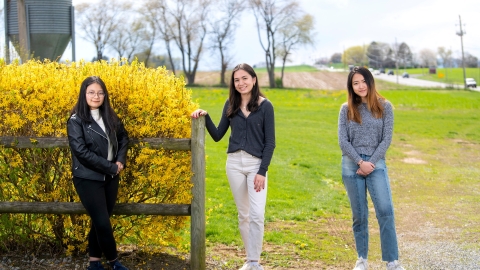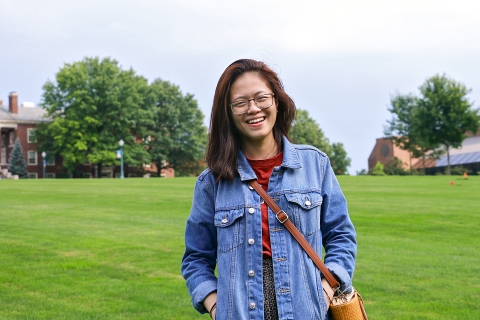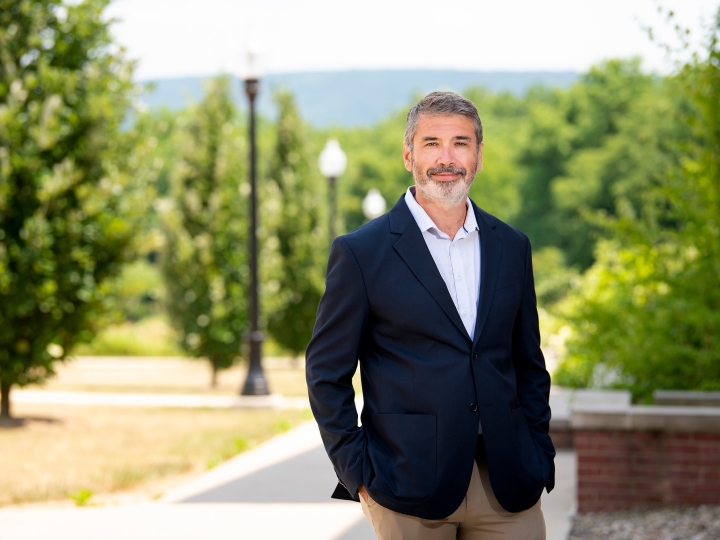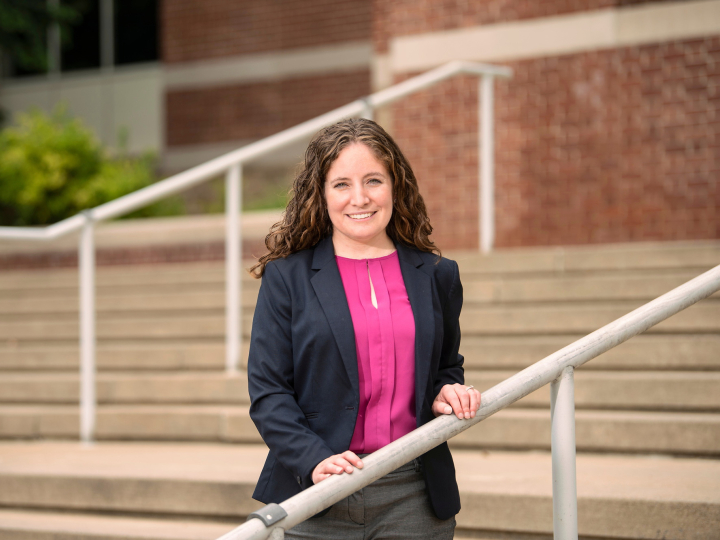
Blueprinting the Manufacturing Boom: Economics Study Draws Pandemic Insights From Rural Pennsylvania
April 30, 2021
From left: Sherab Dorji '22, Rachel Johnston '22 and Clara Han '21 served as research assistants on the rural Susquehanna research project. Photo by Emily Paine, Communications
In a year that tested nearly every facet of U.S. infrastructure, Bucknell's backyard served as a compelling case study for economics research exploring the revitalization of rural America post-pandemic.
When global supply chains were massively disrupted amid the spread of COVID-19, America's dependence on foreign imports was brought into sharp focus for Professor Christine Ngo, economics. The necessity of strong, robust domestic manufacturing to curb the economic crisis was made even clearer.
"Manufacturing in rural America can be overlooked because of this misconception that economic opportunities don't exist in these areas, but these businesses actually perform quite well," says Ngo, whose interests include the political economy of development, industrialization and international trade. "However, manufacturing also faces several challenges that stifle its growth on the whole. That stagnation increases the American economy's vulnerability in crises like COVID-19."
To get a clearer picture of those challenges and the impact of the pandemic on the rural economy, Ngo and a team of four student researchers turned to executives, small business owners, workers and community leaders in the Susquehanna River Valley. An in-depth analysis of 60 interviews conducted throughout 2020 revealed insights that the team hopes can form a blueprint for bolstering rural businesses and working communities nationwide.

Professor Christine Ngo's expertise includes the political economy of development, technological change and economic growth, and
international trade. Photo by Emily Paine, Communications
Lost Labor
Perhaps the most crucial of those insights is what Ngo describes as a simultaneous job surplus and chronic labor shortage. While rural Pennsylvania offers a multitude of employment opportunities in health care, education, gas and lumber, potential workers face personal hurdles that undermine their ability to perform well in these positions.
Multigenerational poverty, struggles with addiction, limited child care access — all of these and more create significant barriers for willing workers. And for those who lack education or training, employers are often hesitant to incur extra costs to bring them up to speed.
"If we couple that with the lack of attention policymakers pay to rural areas in comparison to urban hubs, we start to see why U.S. manufacturing may be struggling to grow," says Rachel Johnston '22, a Spanish and economics double major from Ridgefield, Conn.
As a research assistant on the project, Johnston helped transcribe interviews and write literature reviews that will directly contribute to two academic papers Ngo is writing on the subject. In her analysis, "greater investment in rural America and broader access to resources is a key part of strengthening the manufacturing sector and creating a more equitable economic framework."
The other, Ngo says, is a bold renegotiation of the relationship between workers and their employers.
"The contract has to shift from being transactional to being interdependent because working together to address the issues workers are facing is beneficial for both employers and employees," she says. "Considering how the pandemic has encouraged reliance on one another, I think we have a valuable opportunity to redefine that relationship, which could ultimately boost our economy."
Coming Out Ahead
The pandemic also created unexpected opportunities for businesses to adapt, innovate and even grow, Ngo found. Companies that focused on building or expanding their e-commerce capabilities kept income flowing, and those with diversified products and service regions could avoid shutdowns by pivoting production to essential goods. Meanwhile, other businesses expedited automation when workers couldn't report.
That nimbleness will undoubtedly put a number of rural enterprises ahead coming out of the pandemic, creating an even stronger foundation for weathering the next unforeseen crisis.

Mathematical economics major Huong Dang '22 values the opportunity to collaborate closely with professors on Bucknell research. Photo by Emily Paine, Communications
"Once the domestic manufacturing capability is revamped and a national self-sustainable supply system is built up, the U.S. will have adequate critical supplies to confront the next major economic shock," says mathematical economics major Huong Dang 22, whose heavy lifting on the study earned her a co-authorship alongside Ngo.
"As someone who's interested in international trade and economic development, this project allowed me to learn so much about empirical economics research by being involved in every aspect," she adds. "I think the opportunity to not simply be a student but also a collaborator is an amazing advantage for Bucknell researchers."

